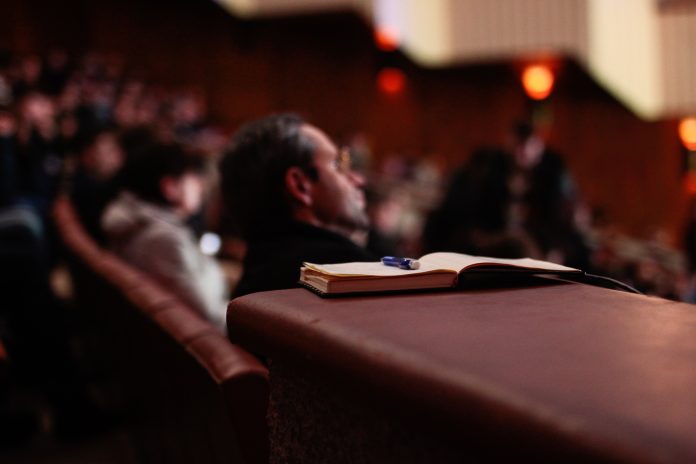
Some members of DePauw University faculty continued to raise concern about their treatment and value in front of administrators during a two-and-a-half-hour faculty meeting Monday, Sept. 18. Several professors also criticized the administration for a lack of transparency in the school’s governance and financial future.
“We have a failed system,” said Susan Hahn, professor of English. She went on to say that the administration may not represent the best interest of the faculty in discussions with the board of trustees. So, she posed the question, “How can the faculty input be represented on the Board of Trustees, outside of the president or other administrators?”
Conversation over a proposed addition to the Academic Handbook, which would allow faculty members to participate in the recruitment and appointment of senior administrators, started a heated dialogue over the input faculty have on University hiring decisions.
Glen Kuecker, history professor and former chair of the Faculty Priorities and Governance Committee, said that the original proposal included an additional stipulation that would allow faculty input on the retention of administrators. Kuecker said that this stipulation was originally agreed on by the administration, but prior to approving the new language, President Mark McCoy shifted positions on the issue.
President McCoy denied shifting positions and said, “There are questions that the president and the administration can deal with, and there are questions over the president’s head.” As a result, any policy that allows faculty input on the retention of non-academic administrators would not be accepted by the board. Therefore, McCoy advised the committee to adopt the policy as is.
Faculty also raised concerns about changes to the University’s health plan and sabbatical policy. VP of Academic Affairs Anne Harris explained that due to the financial state of the University, the Board of Trustees asked the administration to consider reducing sabbatical benefits.
Currently, DePauw professors receive two-thirds of their salary while on their sabbatical, but this policy may change starting in the 2020-2021 school year. The administration has not made a final decision on reducing the number of sabbaticals or the salary of professors on sabbatical, but they will continue to evaluate this as a cost-saving possibility. Additionally, the Board of Trustees asked the Faculty Health Benefits Committee to search for a cheaper healthcare plan. As a result, the university was able to make significant financial saving by changing providers, due to a technicality on prescription drugs. However, Hahn addressed the lack of transparency in the healthcare selection process as another example of faculty not having a voice in the University.
“I am struggling to understand how screwed we are,” said Peace and Conflict Studies associate professor Rachel Goldberg in response to the University’s financial future. “If we are really really screwed then significant ongoing austerities make sense to me, but it is unclear to how screwed we are. It reminds me of a conversation I had with my parents when they were getting older: How bad is this (Our financial situation)? Do we need to sell the house? It is unclear to me whether we need to sell the house and get a smaller house or if we just need to rethink our life a little bit. So for this situation, I am asking about for transparency.”
President McCoy ended the meeting by saying that the administration does not want to punish or take anything away from anyone. However, because the administration takes its stewardship role seriously, difficult decisions will have to be made.

